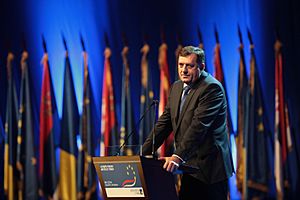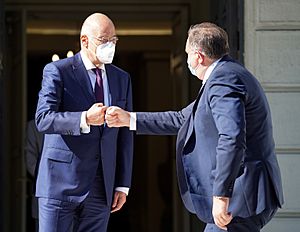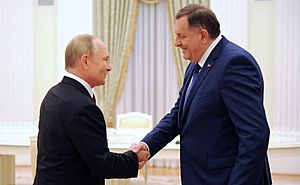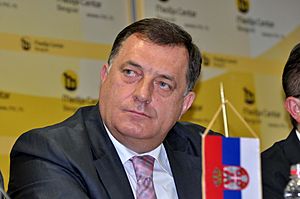Milorad Dodik facts for kids
Milorad Dodik (born 12 March 1959) is a politician from Bosnia and Herzegovina. He is currently the 8th President of Republika Srpska, a position he has held since 2022. He was also President of Republika Srpska from 2010 to 2018. From 2018 to 2022, he served as the Serb member of the Presidency of Bosnia and Herzegovina.
Dodik has been the leader of the Alliance of Independent Social Democrats (SNSD) since it was formed in 1996. He has held several important political jobs in Republika Srpska, which is the part of Bosnia and Herzegovina where most Serbs live. He was the Prime Minister of Republika Srpska from 1998 to 2001 and again from 2006 to 2010.
When he first started in politics, Dodik and his party were seen as moderate and wanting to make changes. However, over time, he and his party have become more focused on Serbian nationalism. They have supported the idea that Bosnian Serbs should have the right to decide their own future. Critics have said that his time in office has involved him trying to weaken the central government of Bosnia and Herzegovina. He has also built closer relationships with Russia and Serbia.
Quick facts for kids
Milorad Dodik
|
|
|---|---|
| Милорад Додик | |
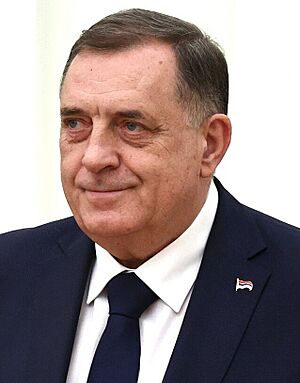
Dodik in 2025
|
|
| 8th President of Republika Srpska | |
| Assumed office 15 November 2022 |
|
| Vice President | Ćamil Duraković Davor Pranjić |
| Preceded by | Željka Cvijanović |
| In office 15 November 2010 – 19 November 2018 |
|
| Preceded by | Rajko Kuzmanović |
| Succeeded by | Željka Cvijanović |
| 16th Chairman of the Presidency of Bosnia and Herzegovina | |
| In office 20 November 2020 – 20 July 2021 |
|
| Preceded by | Šefik Džaferović |
| Succeeded by | Željko Komšić |
| In office 20 November 2018 – 20 July 2019 |
|
| Preceded by | Bakir Izetbegović |
| Succeeded by | Željko Komšić |
| 7th Serb Member of the Presidency of Bosnia and Herzegovina | |
| In office 20 November 2018 – 15 November 2022 |
|
| Prime Minister | Denis Zvizdić Zoran Tegeltija |
| Preceded by | Mladen Ivanić |
| Succeeded by | Željka Cvijanović |
| 6th Prime Minister of Republika Srpska | |
| In office 28 February 2006 – 15 November 2010 |
|
| Preceded by | Pero Bukejlović |
| Succeeded by | Anton Kasipović (acting) |
| In office 31 January 1998 – 16 January 2001 |
|
| Preceded by | Gojko Kličković |
| Succeeded by | Mladen Ivanić |
| President of the Alliance of Independent Social Democrats | |
| Assumed office 10 March 1996 |
|
| Preceded by | Office established |
| Personal details | |
| Born | 12 March 1959 Banja Luka, PR Bosnia and Herzegovina, FPR Yugoslavia |
| Nationality | Bosnian Serb |
| Political party | Alliance of Independent Social Democrats (1996–present) |
| Other political affiliations |
Union of Reform Forces (1990–1991) |
| Spouse | Snježana Dodik |
| Children | Gorica and Igor |
| Alma mater | University of Belgrade (BA) |
| Signature |  |
Contents
Early Life and Education
Dodik was born in Banja Luka. He grew up in Laktaši, where he went to elementary school. He also played basketball for his town's team. In 1978, he finished high school in Banja Luka. He then studied at the Faculty of Political Sciences at the University of Belgrade, graduating in 1983.
Start of Political Career
From 1986 to 1990, Dodik was the head of the local government in Laktaši. In 1990, he was elected to the Assembly of the Socialist Republic of Bosnia and Herzegovina. He was part of the Union of Reform Forces of Yugoslavia.
During the Bosnian War, Dodik was a representative in the National Assembly of Republika Srpska. He formed a group called the Independent Members of Parliament Caucus. This group was the only political opposition to the main party at the time, the Serb Democratic Party. After the war ended with the Dayton Agreement, this group became the core of the Party of Independent Social Democrats (SNSD) in 1996. Dodik was elected as its first president. Later, this party joined with another to form the Alliance of Independent Social Democrats, which Dodik still leads.
Prime Minister of Republika Srpska
First Term (1998–2001)
After some political disagreements, early elections were held in Republika Srpska in 1997. Even though his party had only two seats, Dodik was chosen to be the Prime Minister of Republika Srpska.
Second Term (2006–2010)
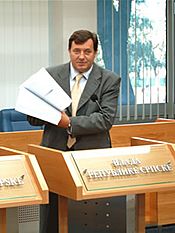
Before the 2006 election, Dodik suggested that Republika Srpska might hold a vote for independence. His party won the election with 46.9% of the votes. At first, many international groups saw him as a moderate leader. They supported him, hoping he would help move away from nationalist politics. Western countries promised financial help if he remained prime minister. They also wanted him to help refugees return to Republika Srpska.
After he won, Republika Srpska received money from the European Union. This money helped pay salaries for government workers and police. In 2007, Dodik visited the United States and met with important officials. He also received aid from the British government.
However, Dodik later became a strong nationalist. He became the most powerful Serb politician in Bosnia and Herzegovina. During a police reform, he gained more nationalist support. Around this time, Haris Silajdžić, a Bosniak member of the Presidency, criticized Republika Srpska and wanted Bosnia and Herzegovina to be more centralized.
In 2008, Dodik and Serbian President Boris Tadić opened a park in Belgrade called "Republika Srpska Park."
In June 2008, Dodik said that Operation Storm, a military operation in Croatia, was a major act of ethnic cleansing against Serbs. Croatian officials criticized his comments.
In December 2008, Dodik made controversial statements about Muslim judges. His comments were widely condemned by international groups and the United States Embassy.
In 2009, Dodik and Serbian President Boris Tadić opened a school in Pale named "Serbia." The Bosniak and Croat members of Bosnia's Presidency were not consulted about this visit.
In October 2009, Dodik used a government jet to pick up Biljana Plavšić, a former president of Republika Srpska who had been released from prison. He said he did it for "moral reasons."
In November 2009, Dodik refused to give documents about a government building project to international prosecutors. He said the court had no power over Republika Srpska. He also accused some officials of being biased against Serbs.
In January 2010, Croatian president Stjepan Mesić warned that if Dodik called for an independence vote for Republika Srpska, Croatia might intervene.
Presidency (2018–2022)
2018 General Election
Dodik ran for the Serb member of Bosnia's three-person Presidency in the 2018 Bosnian general election. He won the election on 7 October 2018, receiving 53.88% of the votes.
Domestic Policy
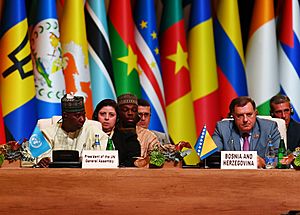
Early in his presidency, Dodik had a disagreement about the flag of Republika Srpska being in his office. He eventually agreed to hold meetings with only the flag of Bosnia and Herzegovina present.
In March 2019, Dodik appointed famous filmmaker Emir Kusturica as his advisor.
In January 2021, Dodik was reported to the Prosecutor's Office for comments he made about a member of the Central Election Commission.
In May 2021, Dodik did not attend a military exercise between the United States Army and the Armed Forces of Bosnia and Herzegovina. The other two Presidency members did attend.
In January 2022, the United States placed sanctions on Dodik. They said his actions were "destabilizing" and threatened the stability of Bosnia and Herzegovina. In April 2022, the United Kingdom also sanctioned Dodik and Željka Cvijanović, the President of Republika Srpska. The UK said they were trying to weaken Bosnia and Herzegovina.
On 16 November 2022, Željka Cvijanović took over from Dodik as the Serb member of the Presidency.
COVID-19 Pandemic
When the COVID-19 pandemic in Bosnia and Herzegovina began in March 2020, the Presidency decided to set up quarantine tents at the country's borders. Bosnian citizens returning home had to self-quarantine for 14 days.
In December 2020, Dodik was hospitalized and later tested positive for COVID-19. He recovered by the end of the month.
In March 2021, Serbian President Aleksandar Vučić visited Sarajevo and donated 10,000 doses of AstraZeneca COVID-19 vaccines. Slovenian President Borut Pahor also visited and promised to donate vaccines.
In April 2021, Dodik received his first dose of the Sputnik V COVID-19 vaccine.
Disagreement with the High Representative
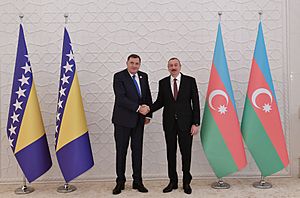
In May 2021, Valentin Inzko resigned as the High Representative for Bosnia and Herzegovina. Christian Schmidt was set to become the new High Representative. Dodik disagreed with this, saying that Republika Srpska would not accept Schmidt unless the United Nations Security Council confirmed him. Russia and China also questioned Schmidt's authority.
In July 2021, Valentin Inzko made a change to the law that banned denying certain past events in Bosnia and Herzegovina. This caused strong reactions from Bosnian Serb politicians, especially Dodik. He stated that Republika Srpska might have to consider leaving Bosnia and Herzegovina. As a result, most Serb representatives stopped participating in the work of Bosnian national institutions, leading to a new political crisis.
In November 2021, Dodik said he would sue the new High Representative Christian Schmidt. He also described a UN Security Council meeting as a "Victory for Republika Srpska."
In January 2022, Dodik said that his party would return to working in the national institutions if a law was passed that banned calling the country's entities "genocidal."
Military Helicopters Controversy
In August 2021, two other Presidency members tried to use military helicopters to help put out wildfires in Herzegovina. Dodik, as the third member, refused to give his permission, which is needed for the helicopters to be used. This caused a lot of criticism.
Dodik explained that the helicopters were old, but the Bosnian Defence Minister said they were fine and that Dodik was the only reason they weren't used.
Withdrawal of Jurisdiction
In September 2021, the Constitutional Court of Bosnia and Herzegovina ruled that a law passed by Republika Srpska about forests was unconstitutional. Dodik criticized this decision.
He then announced that Republika Srpska would withdraw its agreements on the formation of the Armed Forces of Bosnia and Herzegovina and other national institutions. He said everything would be done "within the Constitution." However, some opposition parties did not support these actions.
In October 2021, the National Assembly of Republika Srpska voted to create its own Medicines Agency, pulling support from the national Bosnian Medicines Agency.
In November 2021, Dodik spoke about further withdrawing from the Armed Forces. He suggested that the army should be smaller because not enough Serbs and Croats were joining. He also said it would be good for Bosnia and Herzegovina to have no military at all.
In December 2021, the Republika Srpska National Assembly adopted decisions to move powers from the national level back to the entity level. Opposition parties did not attend the vote.
Foreign Policy
In May 2021, Dodik expressed support for Israel during a conflict, unlike his fellow Presidency members who supported Palestine.
In June 2021, Dodik signed a declaration that included talks about joining NATO.
In November 2021, he met with Hungarian Prime Minister Viktor Orbán and thanked him for Hungary's understanding of Republika Srpska.
In December 2021, Dodik met with Russian President Vladimir Putin in Moscow. In February 2022, after Russia recognized certain regions in Ukraine, Dodik said Republika Srpska would seek to remain neutral. When Russia invaded Ukraine, Dodik stated that Bosnia and Herzegovina was neutral and would not support sanctions against Russia.
European Union
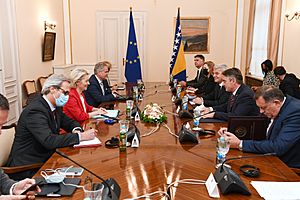
Dodik was once a strong supporter of the European Union, but he has become more critical over time.
In September 2020, Dodik and other Presidency members said that Bosnia and Herzegovina could become an EU candidate in 2021 if it made successful reforms.
In September 2021, Dodik attended a summit in Budapest, Hungary. He criticized the European Union and its handling of the migrant crisis.
On 30 September, Dodik met with European Commission President Ursula von der Leyen in Sarajevo.
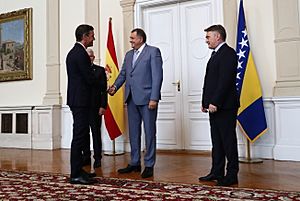
In October 2021, Dodik said that the Western Balkans were further from EU membership than ever before. In December 2021, the German Foreign Minister suggested that the EU should place sanctions on Dodik. In May 2022, Dodik met with European Council President Charles Michel to discuss Bosnia and Herzegovina's EU membership.
Relations with Turkey
On 16 March 2021, Dodik and other Presidency members visited Turkey and met with Turkish President Recep Tayyip Erdoğan. Erdoğan promised to donate 30,000 COVID-19 vaccines to Bosnia and Herzegovina. They also agreed on mutual recognition of driving licenses and cooperation on infrastructure projects, including a highway from Sarajevo to Belgrade.
On 27 August 2021, Erdoğan visited Sarajevo and met with the Presidency members to discuss economic cooperation and the highway project.
In November 2021, Dodik visited Ankara and met with Erdoğan again. They discussed the political situation in Bosnia and Herzegovina.
President of Republika Srpska
First and Second Term (2010–2018)
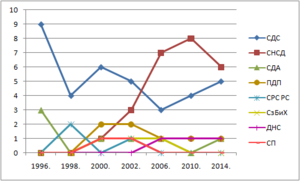
In October 2010, Dodik won the RS presidential election and became the 8th president of the republic.
In May 2011, Dodik planned a referendum that would question Bosnian state institutions. The High Representative for Bosnia and Herzegovina warned that this could harm the Dayton Agreement. Republika Srpska later canceled the referendum after the EU promised to look into their complaints about the justice system.
In October 2012, Dodik suggested that Bosnia and Herzegovina's unified armed forces should be removed. In November 2012, the High Representative Valentin Inzko reported to the UN Security Council that Dodik was often suggesting the breakup of Bosnia.
In January 2017, the United States placed sanctions on Dodik for challenging the Constitutional Court of Bosnia and Herzegovina. The US stated that his actions threatened the stability of Bosnia and Herzegovina.
Third Term (2022–present)
2022 General Election
On 1 July 2022, Dodik announced he would run for president of Republika Srpska for a third time.
After the election, opposition parties made claims of voting problems. The Central Election Commission of Bosnia and Herzegovina recounted the votes. On 27 October, officials confirmed Dodik's victory, stating that while there were some issues, they were not enough to change the election outcome.
Tenure
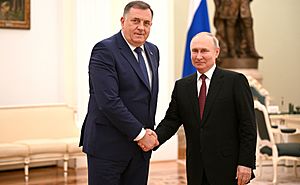
Dodik was sworn in as president on 15 November 2022.
On 23 November, Dodik asked Radovan Višković to form a new government for Republika Srpska. The new government was confirmed in December 2022.
On 8 January 2023, Dodik gave Russian President Vladimir Putin the highest award of Republika Srpska, the Order of the Republika Srpska.
In March 2023, there were protests and violence in Banja Luka related to an LGBT event. The United States Secretary of State Antony Blinken said that Dodik's actions showed he was following an "authoritarian path."
On 27 June 2023, the National Assembly of Republika Srpska voted to suspend rulings by the Constitutional Court of Bosnia and Herzegovina. They also voted to stop publishing the High Representative's decisions. The High Representative Christian Schmidt then canceled these two laws, saying they violated the constitution.
Dodik spoke out against the 2023 Hamas-led attack on Israel and supported Israel in the conflict. The Palace of the Republic in Banja Luka displayed the Israeli flag on 8 October 2023.
On 26 March 2024, Christian Schmidt made new changes to Bosnia and Herzegovina's election law, including electronic vote-counting. Dodik threatened that Serbs would block the national government's work unless these laws were removed and Western ambassadors were expelled.
Legal Challenges
In August 2023, Dodik faced legal action for not following decisions made by the High Representative. High-ranking Bosnian Serb officials said these actions were politically motivated. On 16 October 2023, Dodik did not enter a plea at his first hearing.
On 5 February 2024, Dodik's trial officially began. On 26 February 2025, he was found responsible by a court and was also prevented from serving as president of Republika Srpska for six years. Dodik did not accept this decision. He introduced laws to prevent federal law enforcement from operating in Republika Srpska. This led to further legal actions against him and other officials.
Dodik has continued to travel abroad, visiting Serbia, Israel, and Russia. On 4 July 2025, Dodik appeared before the Court of Bosnia and Herzegovina. The court removed a previous order for his arrest, replacing it with a measure that only requires him to report regularly to a state authority.
Sanctions
The British Government and the United States have placed sanctions on Dodik. These sanctions are for allegedly undermining the unity of Bosnia and Herzegovina and the Dayton Peace Agreement.
Views
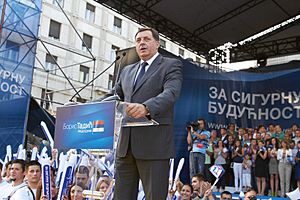
Opinions on Past Events
In 2009, Dodik made statements questioning the truth of certain past events in Tuzla and Sarajevo. The cities of Tuzla and Sarajevo criticized his statements.
The Office of the High Representative said that Dodik's statements were irresponsible. They said his comments undermined the rule of law and his own credibility.
Statements on Srebrenica
Dodik has described the Srebrenica massacre as a "fabricated myth."
In April 2010, he said that the event could not be called a "genocide." He also questioned a 2004 report that had acknowledged the scale of the killings. He claimed the number of victims was lower than reported. The Office of the High Representative responded by saying that the Republika Srpska government should accept the facts.
On 12 July 2010, Dodik said he recognized the killings at Srebrenica but did not consider it a "genocide." This differed from the findings of international courts.
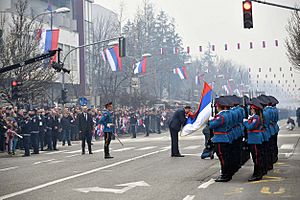
In 2017, Dodik introduced rules that effectively stopped the teaching of the Srebrenica events and the Sarajevo siege in Republika Srpska's schools. He stated that textbooks claiming Serbs committed genocide would not be used.
In August 2018, Dodik again pushed for the 2004 report on Srebrenica to be dismissed. He wanted a new group to review the events. This move was criticized by the international community. The United States State Department said these attempts were part of efforts to change historical facts.
Radovan Karadžić and Ratko Mladić
In March 2016, a student dormitory in Pale was named after Radovan Karadžić, a wartime Serb leader. Dodik supported this action.
In December 2020, a plaque honoring Karadžić had to be removed after the High Representative called for its removal.
In February 2024, Dodik stated that people should not forget Radovan Karadžić or Ratko Mladić. He said they led the nation during a difficult time. He claimed that Karadžić was not proven to have committed crimes in court.
Personal Life
Milorad Dodik is married to Snježana Dodik. They have two children. His nephew, Vico Zeljković, is a businessman and football administrator.
In 2024, Dodik had surgery in Belgrade for problems with his esophagus and stomach.
Honours
- Order of the Republic of Serbia
- Order of the Republika Srpska
- Order of Friendship
- Award of the International Foundation for the Unity of Orthodox Christian Nations
- Order of Peter the Great with Sash
- Order of the Nemanjić dynasty
- Order of St. Sava
- Order of Saint Simeon the Myrrh-streaming
- Order of the Saint bishop Nikolaj
- Holy Cross of the Holy Sepulchre Guardians
- Order of Alexander Nevsky
Honorary awards
- Honorary president of KK Partizan
- Honorary citizen of Drvar
- Honorary citizen of Gradiška
- Honorary citizen of Trebinje
Images for kids
See also
 In Spanish: Milorad Dodik para niños
In Spanish: Milorad Dodik para niños
 | Selma Burke |
 | Pauline Powell Burns |
 | Frederick J. Brown |
 | Robert Blackburn |


